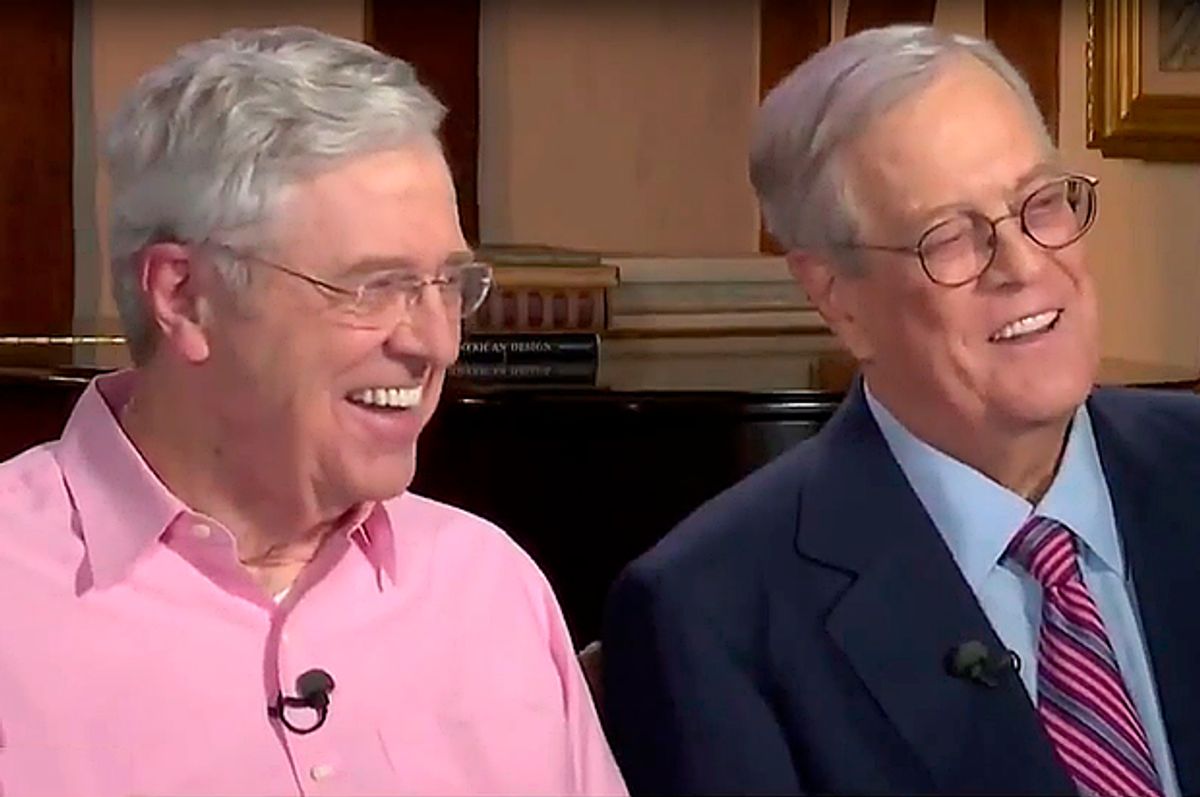The Koch brothers don’t make many media appearances, but when they do, it’s in order to convince you that they’re benevolent billionaires defending our democracy. Last week, for example, Charles Koch agreed to an interview with the Wall Street Journal, in which he lamented the “lack of substance and civility” in our politics. I noted how ironic it was to hear a Koch brother complaining about a political landscape that he, as much as anyone else, helped create.
The Koch media tour continued this morning on MSNBC’s “Morning Joe.” This appearance featured both Charles and his brother David, and their message was simple: Yes, we’ve poured hundreds of millions of dollars into the political process, but we’re not really getting a return on that investment. Indeed, the Kochs want you to know that they don’t have much political influence at all. “Aren’t you still caught up in the same cycle of buying political influence?” Mika Brzezinski asked Charles Koch. “No, no. Well, so far we, we’re largely failures at it, as you can tell,” came his reply.
Because they can’t control the outcome of every election, the Koch brothers insist that their influence is actually quite limited. They’re also misunderstood. All of our concerns about their political activity and about plutocracy and corruption and campaign finance in general are really misplaced. Here’s an exchange between Joe Scarborough and Charles Koch to help clear things up:
SCARBOROUGH: So let’s talk about money in politics. There was a New York Times article, I’m sure you saw it, a couple of weeks back, saying something like 150 families have contributed to the candidates that are in the race right now, the overwhelming amount of money. That’s not a way to run a democracy, is it?
KOCH: Well, you see to me it depends on to what end. If it's to get policies that will create and open up opportunities for people and get rid of all this corporatism and corporate welfare, wherein, what, seven of the richest counties in the country are around Washington, D.C.? I mean, we have two-year presidential campaigns where that's all anybody's focused on. Why is that? It just isn't random. It's because the government's picking winners and losers. And you want to be a winner more than you do a loser, so you give money to slant it your way. The money that we raise, which we hope to raise $250 million for all elections, not just presidential, next year, whether we can or not because I'm going to give very little to that because most of mine goes to my foundation and other things to advance these ideas. So what we're working for is to get that picking winners and losers out of it. And then we won't have two-year presidential campaigns because people will realize it's more important to run their own lives rather than try to control government.
The argument here seems to be that 150 families funding all of our presidential campaigns is only problematic if those families happen to have the wrong ideas. But that’s not how political equality works. While it's an ideal that’s never fully realized in practice, a guiding principle of democracy is that everyone's voice and vote ought to count the same.
Koch is missing the point. If the top one-tenth of one percent of Americans own most of the wealth in this country and if political influence scales with income, then we don’t have anything like a democracy. It doesn’t matter how noble Koch imagines his ideas to be; the point is that his ideas are shaping our system in disproportionate ways, and that’s because of his wealth. When Koch “gives money to slant it” his way, as he put it, he’s subverting democracy, whether he acknowledges it or not. And he can bemoan the process all he wants, but the fact remains: He’s exploited the system as effectively as anyone in American politics. Yet he speaks as though he’s outside the system, as though he’s working to fix it.
The real story here isn’t that the Koch brothers haven’t decided which candidate to support – though that’s what they wanted to emphasize. The truth is that it doesn’t matter who they endorse, just as it doesn’t matter if their preferred candidate wins. Political influence is about much more than election outcomes. The ability to shape discourse, to define the issues and craft the narratives is essential – this is what the Koch brothers have done with unprecedented success.
They’ve erected think tanks, manufactured the Tea Party movement, dumped dark money into countless campaigns, and they’ve co-opted GOP candidates across the country to peddle their libertarian propaganda. As a result, they’ve forced an entire party – including every single GOP presidential candidate - to toe the right-wing economic line.
The Kochs, in other words, have already won.


Shares